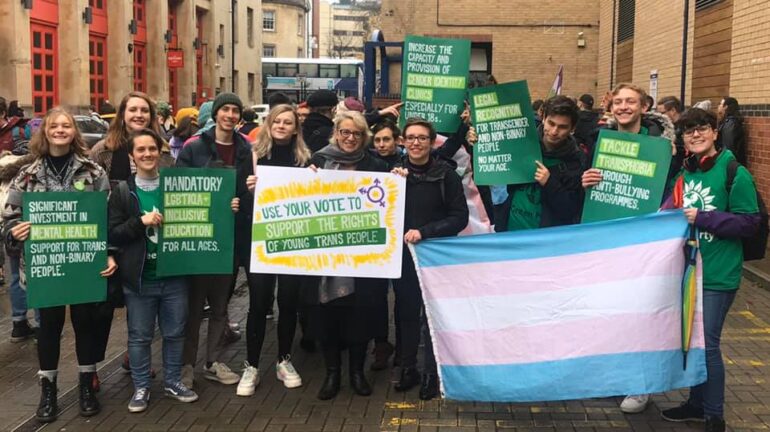International Women's Day – Towards a Scotland women want
Three things have happened recently which, in the lead up to International Women’s Day, have been playing on my mind.
First, my sister gave birth. Not particularly earth-shattering, perhaps, but a big deal for our family, and my first nephew. It was a tricky birth, but we were never overly worried – she was in an excellent hospital with skilled professionals and we were confident, as proved to be the case, that all would be fine.
A few weeks later I attended a screening of Sister, a film exploring maternal healthcare in Ethiopia, Cambodia and Haiti. It was, unsurprisingly, heartbreaking. I was speaking after the film about how unjust debt repayments lead to a lack of investment in healthcare and education and stories of women unable to reach a well-equipped health centre because a promised bridge had never been built, or an ambulance being taken away from a community once its two year lease ended illustrated this link well. But what was most striking to me was the story of an Ethiopian woman who suffered the same complication during birth that my sister suffered just a month ago. There, both mother and baby died, and but for the luck of birth and geography, I have a nephew and another sister on the other side of the world does not.
The third thing that happened was hearing from Nick Dearden who had just returned from a fact finding mission in Greece. Among stories of neo-Nazis roaming Athens and pensioners committing suicide in front of parliament, was another story of maternal healthcare. In Greece, it now costs €800 to give birth. If you are unable to pay, you are sent home and told to manage as best you can.
Maternal healthcare as a feminist issue is often seen as rather old-hat. Tied in with, and often overtaken by, issues of reproductive rights, it is easy to forget the harsh reality of thousands of women dying in childbirth around the world. But austerity, cut-backs and attacks on welfare make the old battles harder, and new battles emerge. The coalition’s cuts may well make maternal healthcare headline news in Britain again.
As always, when social services are cut, women bear the brunt. Not only because women always suffer first and most in situations of hardship, but because women take on work previously provided by government. In Greece women are organising to recruit volunteer doctors, collect women in labour and ensure that babies are delivered safely. In Haiti, traditional birth attendants become the hub of a community and go above and beyond to attend births and provide aftercare.
In the formal economy women’s work often goes unnoticed and unrewarded. Women perform most unpaid care work – of children, the elderly and the disabled. Even when this is recognised through carers allowances and benefits, the pay works out as £1.58 per hour. Women organise food banks, soup kitchens and informal creches. It was women who went without during the miners strikes in order that their husbands and children would be fed. The economy depends on women, but it is not built for us.
The independence debate gives us a chance to talk about reshaping Scotland’s society and economy. The scale of the task and the opportunity can be overwhelming – we can be looking not just at saving the NHS, or reforming taxation, or providing universal free childcare, but at designing whole new systems. At shaping a country which places equality at its heart, and the place of women in this process needs to be paramount.
There is a famous thought experiment proposed by John Rawls in the 70s which poses a situation where rational agents, operating under a ‘veil of ignorance’, are tasked to decide on the rules, principles and structure of a new society. The agents have no idea what their role in this new society will be – their age, gender, nationality and skill set are unknown to them and so they must develop a society without knowing how and if the structure will benefit them.
Rawls concluded that in this situation any group of people would frame a society under two guiding principles. Firstly the equal liberty principle, which states that all members of society have the freedom to pursue their goals without being disadvantaged by race, class, gender etc, and secondly the difference principle which permits inequalities only if they benefit the worst off in society.
In Rawls’ experiment the agents have no preconceived ideas of justice or good, and their conclusions are based on rationality and risk-aversion; if there is a risk you might end up a woman, or disabled, or black, then you will ensure that this situation would not disadvantage you.
Scotland is in the exciting position of being able to carry out an experiment in society-building over the next two years. We don’t have the luxury of approaching the experiment with a veil of ignorance but by instilling the process with ideals of equality and compassion we can be in a position to create a just society.
The role of women in Scotland’s constitutional reform has been hotly debated. Mostly, I suspect, by men. Women voters are currently set to decide the referendum, with the vast majority currently backing a no vote. One theory for this is that the debate had so far focused on traditionally male topics – a fixation on process, on trident, on currency.
Whether or not you agree with that, I certainly think it’s true that were those engaging in the debates able, just for a moment, to wear a veil of ignorance around gender, there would be a richer discussion about Scotland’s future. Would we be looking at radical overhauls of broken systems? Would welfare be in the spotlight? Would discussions about the economy cover more than bankers and budgets?
On International Women’s Day, let’s take the opportunity to think about the kind of Scotland women want. And then let’s make it a reality.




Leave a Reply